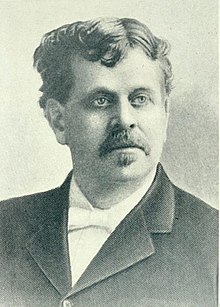Walter P. Brownlow
| Walter P. Brownlow | |
|---|---|
 |
|
| Member of the U.S. House of Representatives from Tennessee's 1st district |
|
|
In office March 4, 1897 – July 8, 1910 |
|
| Preceded by | William C. Anderson |
| Succeeded by | Zachary D. Massey |
| Personal details | |
| Born |
March 27, 1851 Abingdon, Virginia |
| Died |
July 8, 1910 (aged 59) Johnson City, Tennessee |
| Resting place |
Mountain Home National Cemetery Johnson City, Tennessee |
| Citizenship |
|
| Political party | Republican |
| Spouse(s) | Clayetta Ashland Holbach (m. 1870) |
| Relations |
William G. Brownlow (uncle) James P. Brownlow (cousin) |
| Children | 6 |
| Profession | Newspaper editor |
Walter Preston Brownlow (March 27, 1851 – July 8, 1910) was an American politician who represented Tennessee's 1st district in the U.S. House of Representatives from 1897 until his death in 1910. He is remembered for obtaining large federal appropriations for his district, as well as for his intraparty political battles with Chattanoogans Henry Clay Evans and Newell Sanders over control of the state Republican Party. Along with his congressional tenure, Brownlow served as Doorkeeper of the United States House of Representatives from 1881 to 1883, and published the Jonesboro Herald and Tribune from 1876 to 1910.
Brownlow was a nephew of Tennessee's radical post-Civil War governor, William "Parson" Brownlow.
Brownlow was born in Abingdon, Virginia, the son of Joseph and Mary (Barr) Brownlow. He attended common schools for three years until his father's death in 1861. Needing to earn a living, he worked as a telegraph messenger boy. At the age of 13, during the Civil War, he attempted to join the Union Army, but was rejected due to his age. After the war, he worked as an apprentice to his brother in the tinning trade in Rogersville, Tennessee, and later worked as an engineer on the Rogersville and Jefferson Railroad.
In 1876, Brownlow was hired as a reporter by the Knoxville Whig and Chronicle, a newspaper that had been founded by his uncle's protégé, William Rule (and at the time co-owned by his uncle). He generally covered political campaigns that year, namely the canvasses of Augustus H. Pettibone and Emerson Etheridge. In October 1876, he purchased the Jonesboro Herald and Tribune, which he would publish and edit until his death in 1910.
...
Wikipedia
